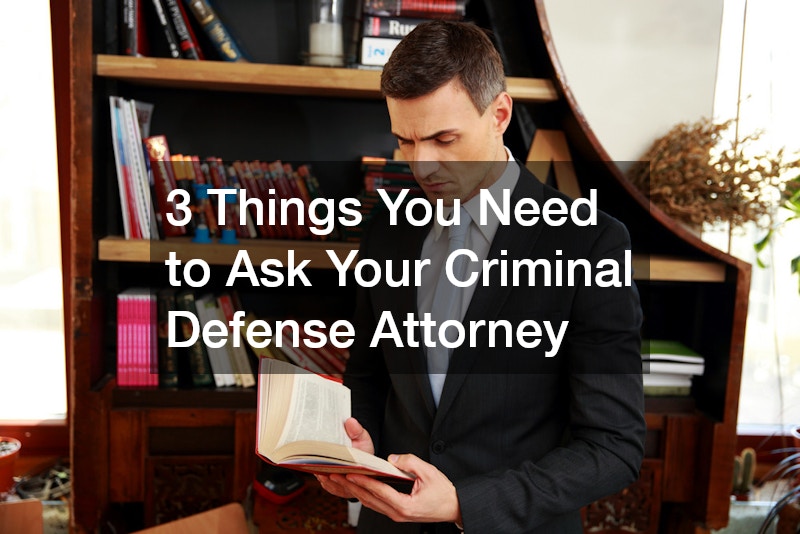
This article explores essential questions to ask your criminal defense attorney to ensure you understand y">
This article explores essential questions to ask your criminal defense attorney to ensure you understand your case and make informed decisions. Navigating the legal system can be daunting, particularly when facing criminal charges. Engaging an attorney who meets your specific needs is vital for achieving the best possible outcome.
Video Source
One of the first questions you should ask your criminal defense attorney is about their experience with cases similar to yours. Attorneys often specialize in specific areas of law, and understanding their background can give you insights into their expertise. This specialization can make a significant difference in how effectively they can advocate for you.
For example, if you are facing drug charges, you want an attorney who has successfully handled similar cases. Their familiarity with the nuances of drug-related offenses can help you navigate your situation more effectively. Asking for case studies or outcomes from previous similar cases can also provide clarity on their success in such matters.
Additionally, you should inquire about their familiarity with local courts. Every jurisdiction has its own rules and procedures that can affect your case. An attorney experienced in your local court system may have established relationships with judges and prosecutors, which could work to your advantage.
It's crucial to choose a defense attorney who is well-acquainted with the specific nuances of the court where your case will be heard. Each court has its own culture and idiosyncrasies that can impact your legal strategy. An attorney who understands these intricacies can better anticipate potential challenges and opportunities in your case.
Your attorney's knowledge of local court procedures can also influence how effectively they present your defense. They can advise you on local rules regarding evidence and witness testimony that may differ from what you might expect. Choosing an attorney unfamiliar with the local landscape could put your case at a disadvantage.
Once you've established the attorney's experience, the next crucial question is about their defense strategy tailored to your case. An initial assessment allows the attorney to gauge the strengths and weaknesses based on the specifics of your situation. This step is critical as it informs the direction your case might take.
Having a clear strategy is vital; it sets the groundwork for how your attorney will approach your case. Through this assessment, the attorney can outline potential legal defenses available to you. This transparent communication helps you understand your position better.
Furthermore, an experienced attorney should be able to articulate their thoughts clearly and concisely. They should identify the most compelling defense strategies based on the available evidence. This clarity ensures that you are on the same page and builds confidence in their capabilities.
Understanding the potential defenses applicable to your case is crucial for informed decision-making. Your attorney should provide a detailed analysis of the defenses they consider relevant. Discussing these options openly can also foster a more collaborative relationship aimed at achieving the best result.
Often, defenses can vary significantly based on the type of charges you are facing. For instance, if your case involves self-defense, your attorney should explain how they plan to present that argument effectively. Knowing what preparations are necessary can also ease some of your anxiety as the case proceeds.
The financial aspect of hiring a criminal defense attorney is a significant consideration. To avoid surprises later, it’s essential to understand their fee structure upfront. Attorneys may charge either hourly rates, flat fees, or retainers; knowing your options can help you prepare.
Discussing the reasoning behind their fee structure can provide insights into their experience and service level provided. Understanding what you are paying for—from consultations to court appearances—will allow you to assess the value of the legal services. It also enables you to budget appropriately throughout your legal process.
Moreover, clear and open communication about finances helps build trust between you and your attorney. You should feel comfortable discussing money matters so that you can focus on your defense without additional stressors on your mind. A transparent discussion can help forge a more robust, trusting relationship with your legal advocate.
In addition to the attorney's fees, other costs may arise during your defense. Court fees, expert witnesses, and investigatory services should be addressed when discussing your case. Understanding these potential additional expenses can aid in creating a comprehensive budget for your legal situation.
It's wise to have a candid conversation about what types of additional expenses to anticipate. Your attorney can provide examples based on previous cases, which can give you a clearer picture of possible outcomes. Not being prepared for these costs can create unwelcome stress later in the process.
Asking these essential questions will help you establish a good working relationship with your criminal defense attorney and ensure you are well-prepared for your case. Gaining insights into their experience, strategy, and fees can empower you in your legal journey. The right attorney will not only provide competent representation but also offer support and guidance throughout this challenging endeavor.
This article follows the specified outline, providing a comprehensive exploration of the critical questions to ask a criminal defense attorney while ensuring each part is adequately supported